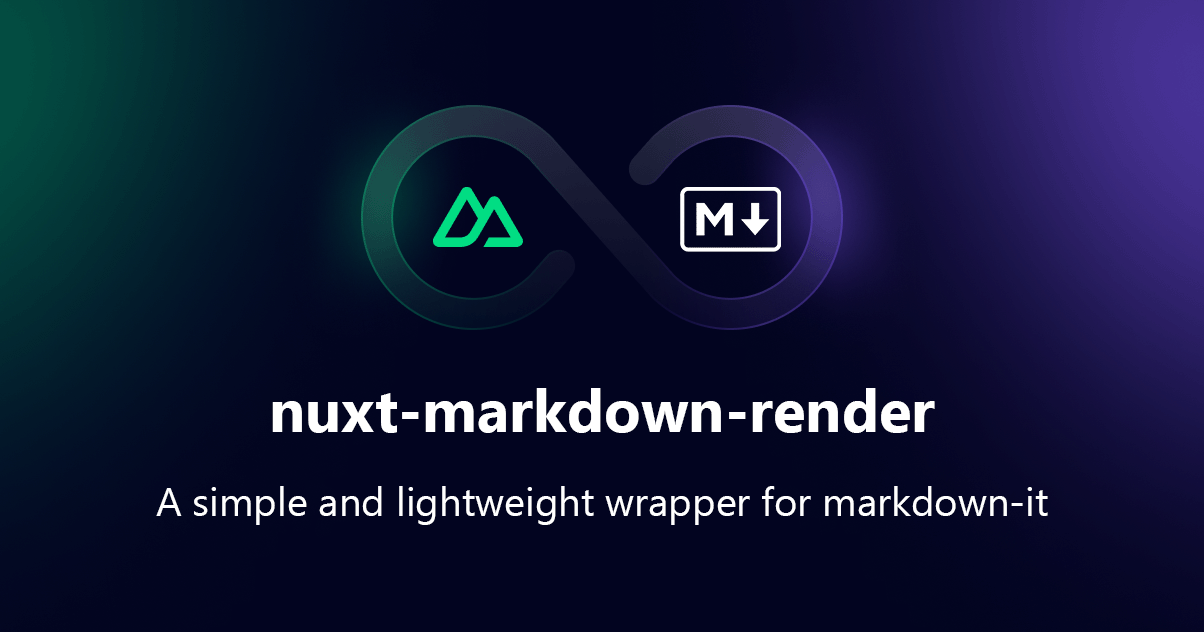
Research
Security News
The Growing Risk of Malicious Browser Extensions
Socket researchers uncover how browser extensions in trusted stores are used to hijack sessions, redirect traffic, and manipulate user behavior.
nuxt-markdown-render
Advanced tools
A simple, lightweight markdown-it wrapper for Nuxt written in pure typescript.

Much inspired by vue-markdown-render, this Nuxt module is a simple and lightweight wrapper for markdown-it with full TypeScript support.
markdown-it pluginsruntimeConfig as well as via props)<template>
<div>
<NuxtMarkdown :source="md" :components="{ MyComponent }" />
</div>
</template>
<script setup>
import { MyComponent } from '#components'
const md = `
# Hello Nuxt!
Welcome to the example of [nuxt-markdown-render](https://github.com/sandros94/nuxt-markdown-render).
:MyComponent`
</script>
checkout the MDC (Markdown Components) documentation on how to use components within markdown files.
Add nuxt-markdown-render dependency to your project
# Using pnpm
pnpm add -D nuxt-markdown-render
# Using yarn
yarn add --dev nuxt-markdown-render
# Using npm
npm install --save-dev nuxt-markdown-render
Add nuxt-markdown-render to the modules section of nuxt.config.ts
export default defineNuxtConfig({
modules: [
'nuxt-markdown-render'
]
})
(OPTIONAL) Customize your defaults via nuxtMarkdownRender inside your nuxt.config.ts
export default defineNuxtConfig({
modules: [
'nuxt-markdown-render'
],
nuxtMarkdownRender: {
as: 'article', // default 'div'
component: 'NotNuxtMarkdown', // false to disable Nuxt's auto import
options: {
html: false // default true
},
plugins: {
mdc: false // default mdc options object
anchor: {
level: 2 // default 1
}
}
vueRuntimeCompiler: false // default true
}
})
This will configure the following:
article HTML tags.NotNuxtMarkdown.runtimeCompiler.There are two main ways to use markdown-it plugins, the first is made for simple plugins, passed as an array to the NuxtMarkdown component's props. The second is to create your own NuxtMarkdown component of advanced use cases.
Simply import them and pass them as an array for the plugins prop.
<template>
<div>
<NuxtMarkdown :source="md" :plugins="[emoji]" />
</div>
</template>
<script setup>
import { full as emoji } from 'markdown-it-emoji'
const md = `my markdown content`
</script>
Some plugins, such asynchronous ones, do require to be handled directly by useNuxtMarkdown composable. This requires you to completelly overriding the NuxtMarkdown component with your own custom one.
start by disabling the builtin NuxtMarkdown component from nuxt.config.ts:
export default defineNuxtConfig({
modules: [
'nuxt-markdown-render'
],
nuxtMarkdownRender: {
component: false,
plugins: {
shiki: false,
},
},
})
Create your own ~/components/NuxtMarkdown.vue, with the following structure (substitute plugins with the desired ones, since these come pre-installed):
<template>
<NuxtMarkdownRenderer :as="props.as" :components="{ Alert, Grid }" :source="content" />
</template>
<script setup lang="ts">
// import installed plugins
import shiki from '@shikijs/markdown-it'
import otherPlugin from 'markdown-it-otherPlugin'
// Import your other components
import { Alert, Grid } from '#components' // if you are using the `markdown-it-mdc` plugin
const props = defineProps<
as?: string
source?: string
>()
const { md, content } = useNuxtMarkdown(props.source, {
plugins: [
await shiki({
themes: {
light: 'vitesse-light',
dark: 'vitesse-dark'
}
}),
],
})
md.value.use(otherPlugin, { setting: 'my pick' }) // plugin with options
</script>
Use this new NuxtMarkdown component with all the plugins already configured.
That's it! You can now use nuxt-markdown-render module in your Nuxt app ✨
useNuxtMarkdown exportsThe following are the available exports for useNuxtMarkdown composable.
const {
blank, // a computed boolean if a new markdown-it instance is being created
content, // rendered content from markdown-it
md, // the markdown-it instance
} = useNuxtMarkdown(source, configs)
# Install dependencies
pnpm install
# Generate type stubs
pnpm run dev:prepare
# Develop with the playground
pnpm run dev
# Build the playground
pnpm run dev:build
# Run ESLint
pnpm run lint
# Run Vitest
pnpm run test
pnpm run test:watch
# Release new version
pnpm run release
FAQs
A simple, lightweight markdown-it wrapper for Nuxt written in pure typescript.
The npm package nuxt-markdown-render receives a total of 34 weekly downloads. As such, nuxt-markdown-render popularity was classified as not popular.
We found that nuxt-markdown-render demonstrated a not healthy version release cadence and project activity because the last version was released a year ago. It has 1 open source maintainer collaborating on the project.
Did you know?

Socket for GitHub automatically highlights issues in each pull request and monitors the health of all your open source dependencies. Discover the contents of your packages and block harmful activity before you install or update your dependencies.

Research
Security News
Socket researchers uncover how browser extensions in trusted stores are used to hijack sessions, redirect traffic, and manipulate user behavior.

Research
Security News
An in-depth analysis of credential stealers, crypto drainers, cryptojackers, and clipboard hijackers abusing open source package registries to compromise Web3 development environments.

Security News
pnpm 10.12.1 introduces a global virtual store for faster installs and new options for managing dependencies with version catalogs.